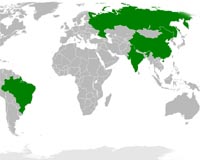| . |  |
. |
Washington (AFP) April 21, 2010 A stronger yuan is "essential" for both the Chinese and world economies, the IMF said Wednesday as it projected breakneck growth for China and a powerful post-crisis bounce across Asia. The International Monetary Fund said the Chinese yuan was "substantially" undervalued, heaping more pressure on Beijing to allow the currency to strengthen to help rebalance skewed world trade. The IMF's latest global report projected that gross domestic product in China, which is set to overhaul Japan this year to become Asia's biggest economy, would rocket by 10 percent in 2010 and 9.9 percent in 2011. But a yuan adjustment would help China tackle "excess demand pressures," the IMF said in an apparent reference to the threat of rising inflation, and give other emerging economies confidence to let their own currencies strengthen. "This is essential for China given its large role in the global market," the Washington-based Fund said. "Greater currency adjustment in Asia would facilitate adjustment in other emerging economies that may fear losing market share if their currencies were to appreciate alone." The yuan has been effectively pegged to about 6.8 to the dollar since mid-2008. Speculation is growing that Beijing may soon alter its exchange rate policy, as a US-led clamor for change intensifies. Critics, including a growing number in Asia as well as the United States and Europe, say an undervalued yuan gives Chinese manufacturers an unfair advantage by making their exports cheaper. As a whole, according to the IMF, Asian economies will expand an average 6.9 percent this year and 7.0 percent in 2011, boosted by both domestic demand and foreign trade. But it urged regional governments to plan an orderly exit from stimulus policies that helped them weather the global downturn far better than the United States or Europe. Japan's moribund economy will return to growth of 1.9 percent this year but persistent deflation, weak domestic demand and a stagnant employment picture threaten a fragile recovery, the report said. Fretting about the risk of contagion from Greece, the IMF cautioned that Japan would in time have to tackle its public debt, which at nearly 200 percent of GDP is the highest in the industrialized world. India should grow by 8.8 percent this year, the report said, but has "less fiscal room for maneuver" than China and needs to trim its swollen public sector and debt. Southeast Asia's five biggest developing economies were seen expanding 5.4 percent in 2010. Australia's resource-driven economy should strengthen 3.0 percent this year, helped by voracious demand for minerals and other commodities to sate Chinese industry's appetite for raw materials. The IMF's China growth forecast was well above the 8.7 percent growth in 2009 and Beijing's own annual target of eight percent, seen as the minimum needed to create enough jobs in the massive nation to prevent unrest. Export-led China is seeking to reduce its dependence on overseas shipments and government-backed investment by pumping up domestic spending. The IMF said Asia in general had to shift off its historical dependence on exports. The Fund cautioned Asian governments against asset bubbles and floods of speculative money that could derail growth, as Western investors seek higher returns and froth builds up in property markets in China and elsewhere. "For policymakers in Asia's export-driven economies, who now face the prospect of weaker external demand conditions, a key challenge is to effect a durable rebalancing toward domestic sources of growth," it said. "With regard to monetary policy, it may not be too early to start unwinding the stimulus if output gaps are closing and inflation pressures are beginning to emerge." burs/jit/dan
Share This Article With Planet Earth
Related Links Global Trade News
 Brazil secures Chinese investment pledge
Brazil secures Chinese investment pledgeRio De Janeiro (UPI) Apr 16, 2010 Brazil secured Chinese pledges to investment heavily in and buy more from Brazil as the summit of BRIC countries - Brazil, Russia, India and China - opened a day early to allow for President Hu Jintao to return to China to oversee earthquake relief. More than 800 people died in an earthquake in western China as Hu embarked on his Latin America visit, which was to have taken him to Ven ... read more |
|
| The content herein, unless otherwise known to be public domain, are Copyright 1995-2010 - SpaceDaily. AFP and UPI Wire Stories are copyright Agence France-Presse and United Press International. ESA Portal Reports are copyright European Space Agency. All NASA sourced material is public domain. Additional copyrights may apply in whole or part to other bona fide parties. Advertising does not imply endorsement,agreement or approval of any opinions, statements or information provided by SpaceDaily on any Web page published or hosted by SpaceDaily. Privacy Statement |